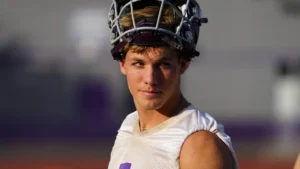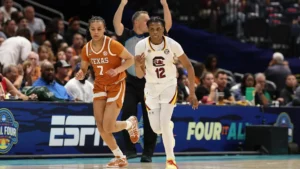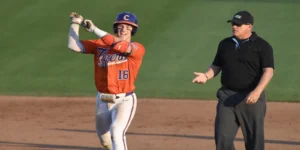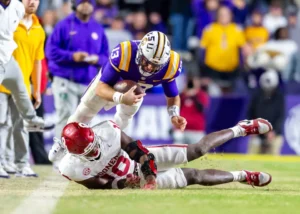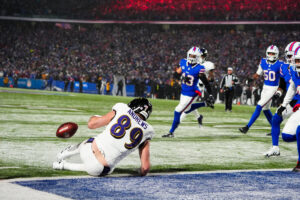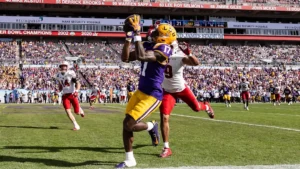
Cheers to Change: Notre Dame to Introduce Alcohol Sales at Athletic Events
The University of Notre Dame, long known for its deep-rooted traditions, commitment to Catholic values, and storied athletic programs, is taking a major step in evolving the gameday experience. Starting with the 2025–26 academic year, fans attending Fighting Irish football, hockey, and men’s and women’s basketball games will have access to alcoholic beverages for the first time in the school’s history. The move marks a significant cultural shift at a university where the idea of selling alcohol at athletic events was once unthinkable. For Notre Dame, this decision reflects changing trends in college athletics, fan engagement, and revenue generation.
Notre Dame’s decision did not come lightly. The university had long been one of the few major programs in the country to hold out against in-venue alcohol sales, citing its faith-based mission and concern for maintaining a safe and family-friendly environment. But after years of internal discussion, benchmarking peer institutions, and observing successful implementation elsewhere, university officials now believe that responsible alcohol sales can be part of a controlled, respectful environment that enhances—not detracts from—the fan experience.
This change will take effect in time for the 2025 football season at Notre Dame Stadium, as well as for the upcoming seasons at Purcell Pavilion for basketball and the Compton Family Ice Arena for hockey. Notre Dame plans to follow best practices developed at other institutions that have implemented alcohol sales, including limits on sales per person, strict ID checks, and designated service areas. The university is also investing in enhanced training for concessions staff and additional security presence to ensure fan safety.
Revenue, of course, is a driving factor. Like other top-tier athletic departments, Notre Dame is navigating a new era of college sports economics. The demands of Name, Image, and Likeness (NIL) programs, the costs of recruiting and facilities, and the pressure to remain competitive in the national landscape all require new streams of funding. Alcohol sales, already proven lucrative at programs across the Power Five and beyond, offer a new and significant source of revenue. Industry studies suggest that programs adding alcohol sales can bring in anywhere from $500,000 to $2 million annually, depending on venue size and attendance. For a program like Notre Dame, with a national fan base and a capacity of more than 77,000 at its iconic stadium, the potential is substantial.
But the university’s leadership is quick to emphasize that money isn’t the only motive. Fan engagement and the evolving expectations of the modern sports spectator were major factors in the decision. As more fans compare their in-venue experience to the comfort and amenities of watching at home, schools must find new ways to make attending games more appealing. Concessions upgrades—including the sale of beer and wine—are a relatively simple but impactful way to meet those expectations. Notre Dame’s own surveys of fans over the past several seasons indicated growing interest in this kind of amenity, especially among younger alumni and out-of-town visitors who attend only a few games each year and want the full entertainment experience.
At the same time, Notre Dame is mindful of the risks. The university is committed to preserving the family-friendly atmosphere that makes Fighting Irish games special, especially at Notre Dame Stadium. It will be critical to ensure that alcohol sales do not lead to increased incidents of misconduct, overconsumption, or diminished enjoyment for fans who choose not to drink. To that end, the university plans to stop sales at a designated point in each game—likely at the end of the third quarter for football and the second half’s under-12 media timeout for basketball—mirroring policies used successfully elsewhere. Alcohol-free seating areas will remain available for fans who prefer that environment.
In addition, Notre Dame’s decision is part of a broader effort to modernize the gameday experience. The university has already made strides in this area, including investments in new video boards, digital ticketing, improved Wi-Fi, and upgraded seating areas. The goal is to bring Notre Dame events in line with the evolving expectations of fans while preserving the unique identity of one of college athletics’ most revered brands. The introduction of alcohol sales is not meant to replace tradition, but to augment it for a new generation.
There is also a recognition that Notre Dame, while special, is not immune to the broader currents of college sports. Nearly every Power Five school now allows alcohol sales at games, with early fears about unruly behavior largely unrealized. Studies have shown that when alcohol is sold in a controlled environment, it can actually reduce binge drinking before games, since fans know they will have access inside the venue. In many cases, schools have seen a decrease in alcohol-related incidents since introducing sales. Notre Dame hopes to follow that model and join the ranks of schools that have struck the right balance.
The university has already begun working with local vendors, licensing partners, and stadium operations teams to prepare for implementation. Discussions are ongoing about which types of beverages will be available, whether local craft breweries will be featured, and how sales will be integrated into Notre Dame’s longstanding partnerships with concessionaires. While beer and wine are likely to be the primary offerings, there is potential for a unique Notre Dame touch—perhaps a custom brew or limited-edition drinks themed around Fighting Irish traditions.
Reactions from the Notre Dame community have been mixed but generally supportive. Some alumni and longtime supporters have voiced concern that this move marks a departure from the university’s core values. They fear that the spiritual and communal aspects of gameday could be compromised. But others, especially younger fans, see the decision as a sensible evolution that reflects the times. Athletic Director Jack Swarbrick, who helped lay the groundwork for this policy before his retirement, has long championed thoughtful modernization. His successor, Pete Bevacqua, has expressed confidence that Notre Dame can lead in this space without sacrificing what makes it special.
Students, who are still subject to the university’s alcohol policy regardless of what happens inside the stadium, have also weighed in. While underage fans will not be served, some student leaders have said they appreciate the transparency and trust that the university is demonstrating by implementing the policy in a controlled and responsible way. Campus safety officials and student affairs leaders are expected to work closely with the athletics department to ensure that the change does not spill over into harmful behavior outside of games.
Notre Dame’s alumni base is famously passionate, and the university has been careful to consult with key stakeholders before making this announcement. Conversations with former players, board members, donor groups, and fan councils helped shape the final decision. The result is a plan that Notre Dame believes will serve the university well—not just financially, but in building a more engaging and inclusive fan culture.
For all the symbolism and scrutiny that comes with any major change at Notre Dame, it’s worth noting that the university is not trying to reinvent itself. The decision to allow alcohol sales at games is part of a broader, pragmatic effort to meet the needs of the present while honoring the past. As with every major shift, it will take time to evaluate how the policy is working and make adjustments if needed. But Notre Dame is confident that it can move forward without losing sight of its mission.
The Fighting Irish have always strived to be more than just another program. They represent a blend of excellence, tradition, and purpose that few institutions can match. By embracing a change that reflects the evolving landscape of college athletics, Notre Dame is once again showing that it can lead with both vision and values.
And now, as the 2025 football season approaches, fans will raise their glasses—not just to touchdowns and triumphs, but to a new chapter in the storied legacy of Notre Dame athletics.
